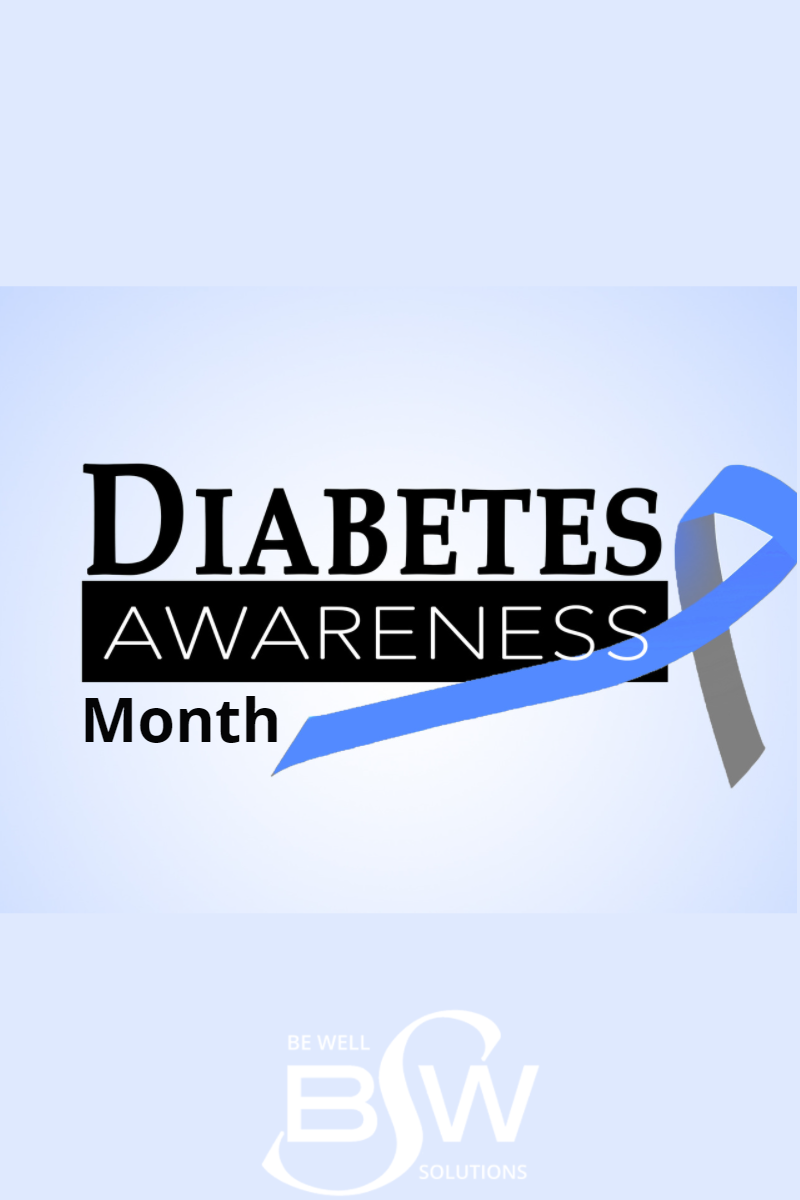
November is Diabetes Awareness Month. Diabetes is a condition where people have higher than normal blood sugar. Nearly 35 million Americans have diabetes. Diabetes has serious complications when it is not managed well. However, diabetes may often be prevented or managed with diet changes and regular exercise.
Regular screening exams are helpful in catching high blood sugar levels as early as possible, and for watching trends in your sugar control. Most adults who get diabetes develop “prediabetes” first, a condition where sugar numbers are high, but not high enough to qualify as diabetic. Prediabetes usually lasts for a few years, before the actual condition develops.
Early intervention is crucial when aiming to prevent diabetes or reduce its’ complications. Some people have physical symptoms when they develop diabetes but many do not, so it is important to have your sugar levels checked regularly. This is especially important if you have a family history of diabetes or have been told you have prediabetes in the past.
What are potential complications related to diabetes?
Diabetes is a leading cause of blindness and kidney failure in adults.
60-70% of people with diabetes suffer from mild to severe forms of nerve damage — like problems with pain, numbness or “pins and needles” feelings in their hands and feet.
Living with diabetes doubles the risk of having a heart attack or stroke.
Diabetes is responsible for more than half of all adult lower limb amputations.
In America, diabetes leads to more deaths per year than AIDS and breast cancer combined.
What are the best ways to prevent and manage diabetes?
Exercise, a healthy diet, and managing your weight will all help reduce the risk of developing blood sugar issues. 30 minutes of daily exercise has been shown to reduce the chance of developing diabetes and improve other aspects of health as well. If possible, people should get a combination of both strength training and aerobic exercise throughout the week for optimal health.
How does strength training help control blood sugar levels?
Regular strength training builds muscle mass and helps our bodies remain sensitive to the insulin we produce. Insulin is the chemical our pancreas secretes to help keep our blood sugar levels healthy. Insulin signals muscle cells to absorb sugar from our blood. Our muscles use can then use the sugar for energy. The more muscle we have, the more effectively we can control our blood sugar.
Natural Steps to Reduce Diabetes Risk:
According to Dr. Walter Willet at the Harvard School of Public Health, there are several things you can do to help reduce your risk of getting diabetes.
- Eat whole natural foods (foods without labels)
- Cut out soda, desserts, and high calorie snack foods
- Incorporate fish 2-3 times a week into your diet
- Increase your physical activity
- Get plenty of fiber
- Eat whole, rather than processed, grains
- Maintain a healthy weight
Why is it important to have your blood sugar checked?
It is a good idea to have your blood sugar checked annually so that you can monitor any changes and speak with your doctor to determine if lifestyle changes, or medications, are needed to help maintain healthy sugar levels.
Blood sugar measurements should be done after fasting for at least 8-10 hours. Fasting blood sugar measurements over 100 require follow-up with your doctor. The chart below lists the American Heart Association’s classification for blood sugar measurements.
|
FASTING GLUCOSE |
LEVEL OF CONCERN |
|
Less than 100 (normal) |
This is normal, but watch for upward trends from year to year. |
|
101-125 (borderline) |
Be careful. People with borderline readings are called “pre-diabetics”. Discuss prevention strategies with your doctor or a specialist (endocrinologist). |
|
Over 126 (high) |
Talk to your doctor about starting management to control diabetes. |
Blood sugars that are increasing annually should also be discussed with your doctor. Before people get type 2 diabetes they almost always have “pre-diabetes”. Even before that, there may be a gradual rise in annual sugar readings. There are many ways to reduce your risk of developing pre-diabetes or full blown diabetes.
What if I already have Diabetes?
Fortunately, many of the complications of diabetes may be prevented with good sugar control. People with diabetes need to monitor their blood sugar regularly. Here are some suggestions if you have been diagnosed with diabetes or want further information for a loved one who has been diagnosed:
Assemble a quality treatment team:
– Your family doctor will be a key part but there are other professionals ready to help.
– Endocrinologists are doctors with special training in treating diabetes.
– Diabetic Nurse Educators are specially trained to provide instruction in managing diabetes.
– Registered Dietitian Nutritionists can help design a healthy diet based on your specific health needs.
Understand the illness. There are a number of resources at your disposal. Contact us at (888) 935-7378 or info@bewellsolutions.com if you need help finding information.
Get an eye exam. People with diabetes should have their vision checked yearly.
Visit the American Diabetes Association at www.diabetes.org
Check out the American College of Physician’s ABC’s of Diabetes Management at www.acponline.org
Continue reading November 2021 Newsletter: Screening Exams for Adults
